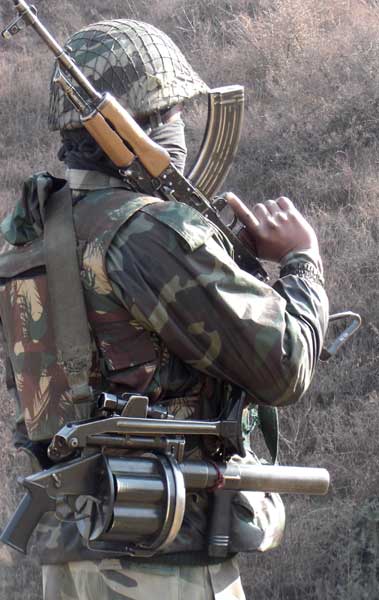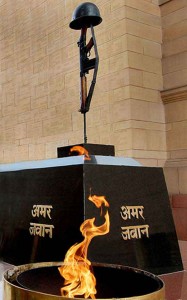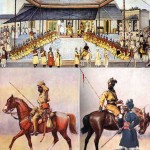IDR Blog
When a Soldier Cries
The profession of arms is all about management of violence, destruction and death. As it is not easy to muster courage and nerve to kill other human beings, soldiers are trained to acquire a streak of raw ruthlessness and brutality. Consequently, according to common perception, soldiers are supposed to be cold-hearted and unsentimental fighters, totally impervious to emotional weaknesses. It is just not ‘soldierly’ to cry and shed tears like other mortals. But then as Voltaire said, “Tears are the silent language of grief”. Grief is a fundamental sentiment. It spares no one and soldiers are no exception. Soldiers by nature are highly sensitive to the environment and its responses.
However, soldiers do not grieve through wailing, howling, weeping and even sobbing. Their grief finds expression not through tears but through their silent anguish. Here are five triggers that overwhelm soldiers’ hearts and make them cringe with pain.
When he loses in battle
Soldiering is not a profession. It is a commitment that every soldier undertakes with missionary zeal to defend his country. It stretches much beyond the normal call of duty as is commonly understood. It is a matter of honour for a soldier to fight and win, whatever be the challenges and cost. It is a trait that becomes an inalienable part of every soldier’s character and provides motivational sustenance. Soldiers see themselves as the sole guardians of national security. Being the last bastion of the state, the military is fully aware of the fact that it cannot fail the nation, whatever may be the odds.
Soldiers were not to blame for the failure, yet they felt that they had let the nation down. Scars of retreat in the face of the Chinese onslaught continue to haunt to date.
Memories of reverses suffered during the Chinese aggression of 1962 still cause immense pain. Despite the fact that the soldiers were ill-equipped and ill-clothed to fight in snow-bound areas, their devotion and valour were in the highest traditions of the services. Soldiers were not to blame for the failure, yet they felt that they had let the nation down. Scars of retreat in the face of the Chinese onslaught continue to haunt to date. Inability to dominate and crush forces inimical to national interests makes soldiers miserable. They become restless for an opportunity to redeem their lost honour.
When he loses a mate
Self preservation is a strong natural instinct and subordination of personal interests to group interests is against normal human psyche. However, military life is all about camaraderie and group cohesion. Indian military thrives on shared commitment among soldiers to achieving the assigned goal. Shared commitment flows from cohesion developed through rigorous training, caring and emotional bonding. It is not uncommon to see soldiers risk their lives for their colleagues. Soldiers are neither reckless nor impulsive. They are fully aware of the trauma and privations their families would have to suffer should they die in the call of duty. Their inexplicable behavior is purely due to intense attachment and loyalty to their colleagues and the group.
The worst thing for a soldier is to lose a ‘buddy’. Poignant notes of the ‘Last Post’ send shivers down the toughest of soldiers’ backs. Tears shed in the memory of a fallen comrade are invariably accompanied by a sense of guilt and helplessness. Many tend to blame themselves for their failure to save their colleague’s life. This is the reasons why arms are reversed while bidding final farewell to a friend.
When his leaders let him down
Military as an institution sustains itself on the trust-loyalty equation existing between the leadership and the rank and file. To be trusted is the greatest compliment that a leader can earn. Trust is the expectancy that the followers can rely on a leader’s immaculate personal conduct and professional competence. It flourishes on the credibility that a leader enjoys in his command. Soldiers willingly repose faith in a leader in the belief that he would remain incorruptible and morally upright.
When military leaders indulge in land grabbing, sale of liquor or fake encounters, soldiers start wondering whether such leaders deserve their trust and confidence. They get disillusioned as their faith in the uprightness and integrity of the leadership gets shaken. They feel let down by the leadership that they had trusted unquestioningly. Worse, loss of credibility makes soldiers doubt their military competence and worthiness. They cry out in anguish as they find that their icons of morality are unworthy of their trust.
When countrymen fail to understand him
Soldiers’ dedication to duty, loyalty to the nation and willingness for the supreme sacrifice are driven less by material considerations and more by an overwhelming urge to earn love and respect of their countrymen. As the soldiers know that their image in the society is dependent on media projections, they tend to be very sensitive to adverse publicity and undue criticism. They feel betrayed that their national media ignores their contribution and highlights a few aberrations.
Soldiers doing duty in remote and uncongenial areas feel terribly pained when a few acts of misdemeanor and indiscretion are cited to paint a negative picture of the services as a whole.
Soldiers do not question subjecting the military to public scrutiny. However, they want it to be done in an objective and balanced manner. For example, quite unfairly, in the recent case pertaining to Adarsh Housing Society, the media has twisted the facts so blatantly to make it appear to be a scam perpetrated exclusively by the service officers. Worse, Army’s prompt action against transgressing officers is never recognized. Further, it is most demoralizing when a few self-proclaimed chair-bound activists make their living through regular military-bashing. According to them, anti-national crowds can throw stones at uniformed persons and maim them, but return fire in self-defence is not acceptable.
It is unfair to expect that there would be no aberrations in a 1.3 million strong force. However, it must be appreciated that 90 percent of the troops are deployed on borders or in counter-insurgency operations. Soldiers doing duty in remote and uncongenial areas feel terribly pained when a few acts of misdemeanor and indiscretion are cited to paint a negative picture of the services as a whole. They wonder if the countrymen understand their trials and tribulations. They cry for the nation’s empathy and recognition.
When the government shows apathy
A supportive government’s compassion acts as a major motivator for the soldiers. It is not a question of financial remunerations alone. It is the way a government treats and values its soldiers that matter. Except for token inanities on Independence Day, the Government has singularly failed to appreciate the intensity of sense of hurt of the soldiers at their continued neglect. Frequent degradation of their status through manipulated pay commission awards has made them skeptical about government’s intent.
In the recent past, India was witness to the most unfortunate sight of numerous military veterans returning their medals to the President to register their protest against Government’s indifference to their pleas. Medals earned during active service are the proudest possession of soldiers and their being driven to surrender them should have made the Government sit up and take note. But true to its wont, the Government remained totally unconcerned and unmoved. This episode will certainly go down as a dark chapter in the history of Independent India.
When the government expresses its inability to spare a small piece of suitable land for a war memorial in the capital to honour independent India’s martyrs, it hurts every soldier. They consider it to be an affront to the memory of those who made the supreme sacrifice. When a senior member of the ruling party declares that commemoration of Kargil war is not warranted as the war took place due to an intelligence failure of the earlier government, soldiers are left aghast at the brazenness of the logic. When the government adopts a negative attitude and makes no effort to redress their genuine grievances, the soldiers are left a disillusioned lot with no one to provide solace.
Finally
Military is a social organization, albeit highly structured and disciplined. It consists of living human beings with their normal share of sentiments and idiosyncrasies. Soldiers also emote and go through phases of elation and sorrow. It is just that they are trained to keep their emotions under control lest it affects their performance in crisis situations. Their anguish remains muted due to their strong sense of loyalty to the country and to uphold military honour. For that reason, soldiers need to be handled with sensitivity and compassion
Post your Comment
8 thoughts on “When a Soldier Cries”
 Loading Comments
Loading Comments






Your articles are always a knowledge and value to go through whether in uniform or CVs. A great learning and awareness to harsh realty . Having lost my young son in law , Major Anuj Sood,SC just a year back my emotions got triggered once again. A great article with so well presented facts. Thanks
Great article, I loved my brothers who have spilled their blood for our Mother India. Jai Hind.
Well researched and excellently presented. It also reveals that there are some thinking brains in our army hierarchy . Mostly our army is known for Generals who stand forgotten duly , for they existed only during their time in service and accomplished nothing that can be called note worthy. Not every one in the country is privileged to hold that rank where he can contribute to the institution and the personnel under his authority such that, his memory is engraved in their hearts and minds. Most have been time servers and simply wiled away their time and awaited the day to be on the pension list ! (unless planning to be sponsored for gubernatorial appointments and scheme for ways to earn some extra cash while the going is good !)
Some of the in house demotivations and contributory causes have been missed.
One doesn’t become a soldier in a week – it takes training, study and discipline. In our country this soldier is not counted as a human resource once he hangs his uniform. A sorry state indeed, with no corrections in sight.
I can vouch that every word of the article is true to the core. I have personally gone through these pains.
An extremely honest and true article. It depicts a soldier’s anguish in right colours. Thanks IDR for such a nice article. Wonder how can all citizens of this country can be made to read it.
Sir, It stoutens my heart to know that a Fauji has captured the essence of the soldiers soulful emotions. I am indeed very proud to have been in uniform. Because all those who read your thoughts will atribute the same skills to any uniform, including mine. Thank You.
May I please share my thoughts with you. I believe that these matters must be shared with as many compatriots as possible. This will eventually enlighten all voters as to how important it is that we select a competant & capapqble government at every stage of governance. It will take some time sir – but that time can be counted only after a start is made. Now is the time I feel.
Perhaps pens like yours should be writing for the public and al Forums of Ex servicemen. Perhaps knowledgable Faujis like you ought tpo be seenn on TV programmes related to natiobuilding and indeed ghet the rightful dues the Indian Armed Forces deserve. We have been HARMED FPORCES because we took it in silence. Now we must speak ou.
Thank YOU Sir.
With deep regards.
Cdr. M.A. RAihan SC IN Retd.
Mumbai.
9821067626
‘cerpt from the IN published Book “Transition to Eminence” (available over the net.)
..Apart from such operational and leadership issues, there were events that attracted adverse public attention:
The allegations in 1987 of kickbacks in the choice of submarine in the SSK
Submarine Project.
The senior officers alleged to have courted politicians for personal advancement
and key appointments.
The disinclination to stand by an officer, imprisoned for alleged treason, who
subsequently was cleared by the Supreme Court.
The marked increase in the number of cases where senior service officers started
seeking the intervention of the Courts to redress the injustice that they felt had
been done to them.
Being in the public domain, these events have been addressed to the extent that
information is reliable and not sub-judice. There has been much soul searching amongst Senior Officers of the Armed Forces as to the causes that have led to this situation. It is perhaps wise to view this in the context of the changes sweeping across the sociocultural framework of India as a whole. The Navy could not remain unaffected by the societal churning that was transforming a medieval, splintered, colonial India into a modern, unified, democratic nation-state.
In the 1970s and 80s many incoming personnel held values which were markedly more ‘self-centred’ than centred on ‘Navy’ or ‘nation’. Weaknesses ingrained in the fabric of a feudal society emerging from colonial rule showed up as flattery and sycophancy, a desire to please those in power and putting self interest above the larger naval interest.
‘Careerism’ was contaminating substantial segments of Indian society. “The careerist officer believes that he has a job to perform within a corporate
bureaucracy, that the true measure of success is how far and how fast he can climb to what he perceives as the ladder of success. His credo is risk avoidance and promotion of self, his loyalty is entirely personal, his ethics situational.